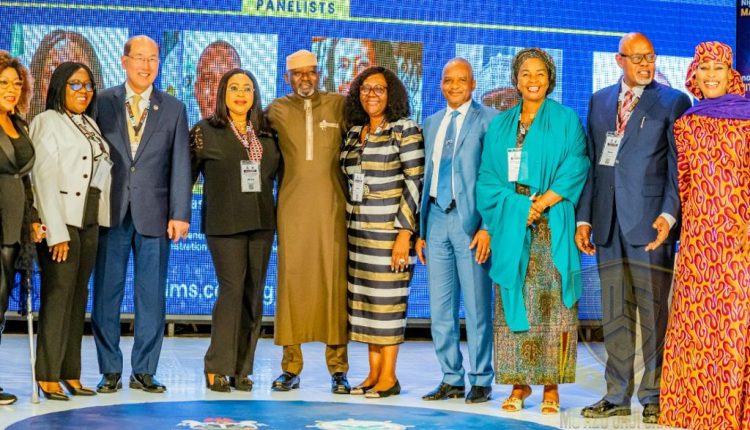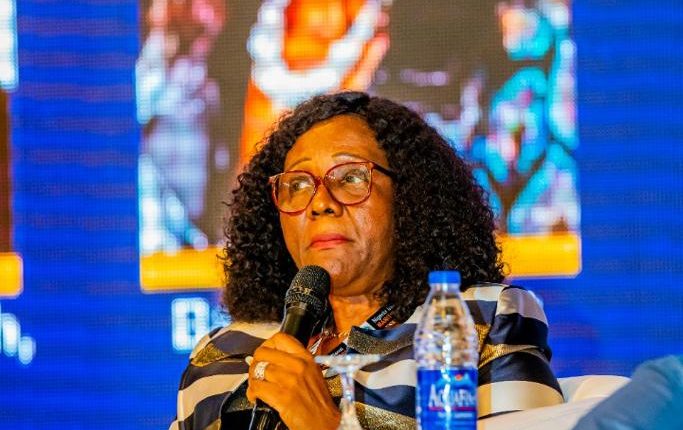Shipping Decarbonization Discourse: Africa deserves inclusion to ‘voice’ her challenges, seek solutions –Orakwusi
Chairperson of the Nigerian Shipowners Forum, Mrs. Margaret Orakwusi, has expressed the importance for Africa’s inclusion at the global platforms when talks about decarbonization of the shipping are being discussed.
She made this submission during a panel discussion at the just-concluded Nigeria International Maritime Summit (NIMS) in Lagos, which had in attendance Mr. Kitack Lim, the Secretary General of the International Maritime Organisation (IMO), and moderated by Barrister Mfon Usoro, Chairperson, NIMS Governing Board.
The Summit was themed: ‘De-carbonization and Greenhouse Gas Emissions in Shipping – Policy and Operational Perspectives from West and Central Africa.’

Speaking, Orakwusi said: “We have always wanted to be at the discussion table to be able to express what we are going through as operator and be part of the solution.”
Giving insights that indigenous shipping operations are highly-regulated in-country, since they only own smaller crafts, Orakwusi shared on some efforts by the trawler owners as private sector operators on improving their activities for the benefit of the environment.
She said: “Now, AGO(Diesel) which will power the vessels in the country, is highly regulated and developed according to NNPC specification- it is a maximum of 0.5% of Sulphur that is stipulated and applied.
“But when you talk of the ship operating in Nigeria, we deal more with the small crafts. Our source of AGO is very well-known and controlled. Our activities are also controlled.
“I come from a trawling industry(Private sector), so, we have even gone as far as changing our netting system, introducing the use of solar energy at our shore facilities. We have brought in new platforms and new technology that we can afford, to reduce the need for us to be out there when we shouldn’t be.
“However, we need to change some of our old vessels that are consuming the heavy fuel oil and becoming uneconomical in the face of what is happening now, to continue to use them.”
She expressed concern about what would happen to some vessels that a big ship-owning firm said it would stop using in line with the new Sulphur-cap requirements for ships; the IMO should have that closely monitored, she said.
Her words: “Recently, a big shipping company announced that they had ordered 19 ships that would use green methanol. We clap for that, but in the process of changing those vessels to reduce the carbon emissions, where are those vessels going to be ‘buried?’ Because what we always see is that such vessels are brought to Africa environment.
“I advocate that a monitoring group be established to be able to document the quality of AGO that the ocean-going vessels use when they call at our ports. We own smaller crafts and our activities are highly-regulated, but the big vessels come because we are highly import-dependent and do exports too, which are transported by the big vessels.”
Concerning the transitional fuel in effort to regulate shipping carbon emissions, Orakwusi views it as encouraging since Africa has gas supply in abundance. And on the outcome of the COP27 regarding compensations for threats suffered by developing countries as a result of climate change, Orakwusi said fingers were still crossed as the highlight focused on effects than causes.
She added that as much as Africa has been heard at the COP27 Summit in Egypt, the continent should be well represented in a committee that should be established for further discussions and reviews of causes, impacts and solutions, to its environmental issues.
While seeking that Africa be seen and treated as partners and stakeholders in all the discussions, Orakwusi also called for support to boost shore facilities at Africa’s ports.
She said: “With regards to the compensation for losses suffered as analysed at the COP27, I think the Port Authorities should be supported to be able to get equipment and requisite technology to enable them test the quality of fuel oil being used by the big vessels that call at our ports, to ensure compliance.”
Orakwusi tasked the industrialised nations on the need for sharing important information and technology that would sustainably address the problem of carbon emissions in shipping.
“But you find that we do not have the technology, because it is very expensive and we have been asking for transfer of technology. But, we all know the industrialised nations would not want to share technology with you just like that.
“However, the saying that the world is now a global village simply means that there is need to share necessary information and data, for the good of all,” she said.
She used the opportunity to talk about the problem Africa faces when poachers keep engaging in Irregular, Unregulated and Unreported Fishing (IUU), which is a known threat to the marine ecosystem.
Her words; ‘I want to use the opportunity to mention the issue of Irregular, Unreported and Unregulated (IUU fishing). We no longer as a country do pair trawling, but we have poachers who come into our environment and do all that.
“I was shocked to know that in one of the African countries, poachers use dynamite for fishing. So we have wanted a platform at international level to cry out because our environment is being abused.”

